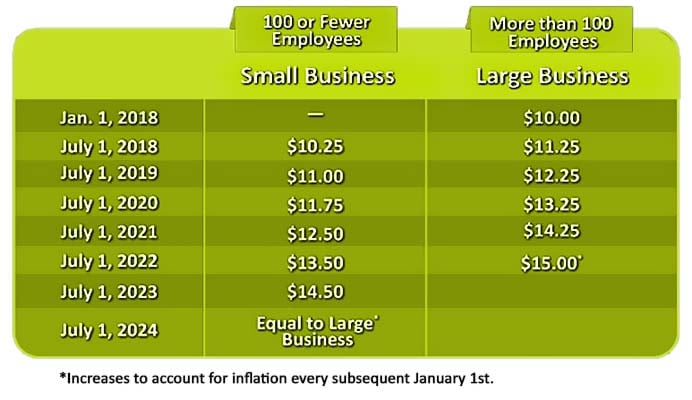Redpath Welcomes Mike Dunkle as a Transaction Advisory Services Partner
ST. PAUL, MN – February 3, 2026 – Redpath and Company is pleased to welcome Mike Dunkle as a Partner in the firm’s Transaction Advisory practice....

February 23, 2018 — Employers with employees working within Minneapolis city limits have additional employer obligations for minimum wage requirements. Effective January 1, 2018, the first phase of the Minneapolis Minimum Wage Ordinance went into effect (Minneapolis Code of Ordinances Title 2, Chapter 40, Article IV).
The ordinance sets a new hourly minimum wage standard for work performed in Minneapolis. For all other employers with employees working outside of Minneapolis, the Minnesota Minimum wage is $7.87 an hour if annual sales are less than $500,000 or $9.65 an hour if sales are greater than $500,000.
Step 1: Do you have non-exempt hourly employees performing services in Minneapolis? If yes, see the following. If no, it’s still best practice to review your hourly employee’s rates for compliance at the state and federal levels.
Items to consider:
Step 2: Determine business size for minimum wage thresholds. See the source link below to determine business size.
Step 3: Follow the ordinance rules to pay minimum wage accordingly and be mindful of the increased rates each year thereafter. Below is a chart from the City of Minneapolis:

Image Source: City of Minneapolis
Additional information regarding the ordinance can be found through the following City of Minneapolis links:
http://minimumwage.minneapolismn.gov/
http://www.ci.minneapolis.mn.us/news/WCMSP-207170
If you have any questions about this ordinance, please contact Heather Larson at Redpath and Company.

ST. PAUL, MN – February 3, 2026 – Redpath and Company is pleased to welcome Mike Dunkle as a Partner in the firm’s Transaction Advisory practice....

The Redpath and Company BottomLine Newsletter ishere!

As 2025 drew to a close, the Governmental Accounting Standards Board (GASB) issued Statement No. 105, Subsequent Events. While the requirement to...